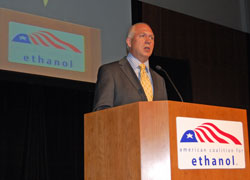 The Missouri Department of Natural Resources (DNR) held their annual fleet manager workshop yesterday in Jefferson City, Missouri. Approximately 45 were in attendance and five speakers presented, including State Fleet Manager Cindy Dixon (pictured).
The Missouri Department of Natural Resources (DNR) held their annual fleet manager workshop yesterday in Jefferson City, Missouri. Approximately 45 were in attendance and five speakers presented, including State Fleet Manager Cindy Dixon (pictured).
Discussed were issues relating to annual reporting, alternative fuel purchasing requirements, E85, and biodiesel among more.
“It’s exciting to see the drastic increase in E85 fueling stations throughout Missouri this past year,” said Missouri DNR Energy Specialist and Alternative Fuels Coordinator Cindy Carroll who moderated the workshop. Missouri added 68 E85 sites from Aug. 2007 to Aug. 2008 bringing the total to 97 facilities. Missouri ties Iowa for 5th in the largest number of E85 fueling locations.
Carroll noted that the state requirement for alternative fuel vehicle purchase has increased from 50 percent to 70 percent over the past year. Also, E85 fuel usage among state fleet vehicles has increased by 53 percent.



 One of the most common questions from potential customers in the United States is whether installing the kit will affect their vehicle warranties, but Lacy claims they have had no problems with that. There is also the issue of EPA certification, which currently has only been granted to another company,
One of the most common questions from potential customers in the United States is whether installing the kit will affect their vehicle warranties, but Lacy claims they have had no problems with that. There is also the issue of EPA certification, which currently has only been granted to another company,  Karol Aure-Flynn, executive director of the
Karol Aure-Flynn, executive director of the  Presentations are now
Presentations are now  While Congress debates whether America should drill for more oil along the coasts of the country, a more valuable, greener source of energy could be offshore.
While Congress debates whether America should drill for more oil along the coasts of the country, a more valuable, greener source of energy could be offshore.
 Construction on what is expected to be the nation’s first commercial cellulosic ethanol plant in southeast Georgia is making good progress, according to plant officials.
Construction on what is expected to be the nation’s first commercial cellulosic ethanol plant in southeast Georgia is making good progress, according to plant officials. In addition to using woody biomass as a feedstock, they are experimenting with energy crops that can be grown in the region. “We have test plots we have established with Ceres on our Soperton site,” he said. “We intend for the site to be a showcase for some of the technologies we see in the future feeding this industry.”
In addition to using woody biomass as a feedstock, they are experimenting with energy crops that can be grown in the region. “We have test plots we have established with Ceres on our Soperton site,” he said. “We intend for the site to be a showcase for some of the technologies we see in the future feeding this industry.” The Founding Conference of the
The Founding Conference of the  In this edition of “Fill Up, Feel Good,” EPIC executive director Toni Nuernberg talks about how the RFS is helping to keep gasoline prices lower than they would be otherwise and ethanol production continues to help America become more energy independent. The EPA’s decision also allows EPIC to continue with its mission of consumer education about ethanol.
In this edition of “Fill Up, Feel Good,” EPIC executive director Toni Nuernberg talks about how the RFS is helping to keep gasoline prices lower than they would be otherwise and ethanol production continues to help America become more energy independent. The EPA’s decision also allows EPIC to continue with its mission of consumer education about ethanol.